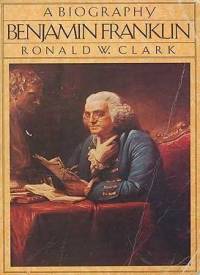This fully documented account of the most versatile man of his age paints a lively portrait of the writer who invented the lightning conductor; the politician who spent years as an emissary in London trying to prevent the Revolutionary War; and the statesman who served as the US representative in Paris during the war, intriguing for French aid and American victory.
Clark takes us from Franklin's early days in Boston, a town that (sadly) he came to despise. A printer's apprentice for his overbearing and less talented brother James, young Franklin found liberation penning phony advice from a fictitious widow, Silence Dogood, and slipping them under the print shop door at night. The success of these bits of writing put Franklin on a path of self-reliance and innovation that lasted his entire life.
Clark follows Franklin to Philadelphia where he deftly maneuvers his way into the printing business, to his scientific endeavors. Not enough of us know that Franklin's experiments in electricity (not just his kite flying) where very serious science in the 18th century. Franklin was highly regarded for the common sense way he approached the subject. Our everyday language of electricity - that it has positive and negative aspects - is Franklin's. I was surprised to know that the facts behind the story of the kite are less certain that I imagined. If the story happened (and it has a whiff of Franklin's direct and simple methods) Franklin may have been keen to keep it quiet after realized how lucky he was to have survived the experience.
Clark details Franklin's importance to the American revolution - especially his long service as diplomat to the French, wheedling out of them the guns, uniforms and supplies the colonies desperately needed to keep fighting the British Army. Clark covers Franklin's flirtatious behavior with the noble ladies of France, but leaves it mostly up to the reader to determine whether he as just playing at seduction as was "a la mode" in elite Parisian circles, or was truly engaged in something more serious. Franklin rather paternal and often long-distance relationship with his wife Deborah is detailed via their letters.
In short, Clark gives a us a Franklin who is an American genius, springing up at a time when the nation most needed a man of his craft, seriousness, subtlety and intelligence.

